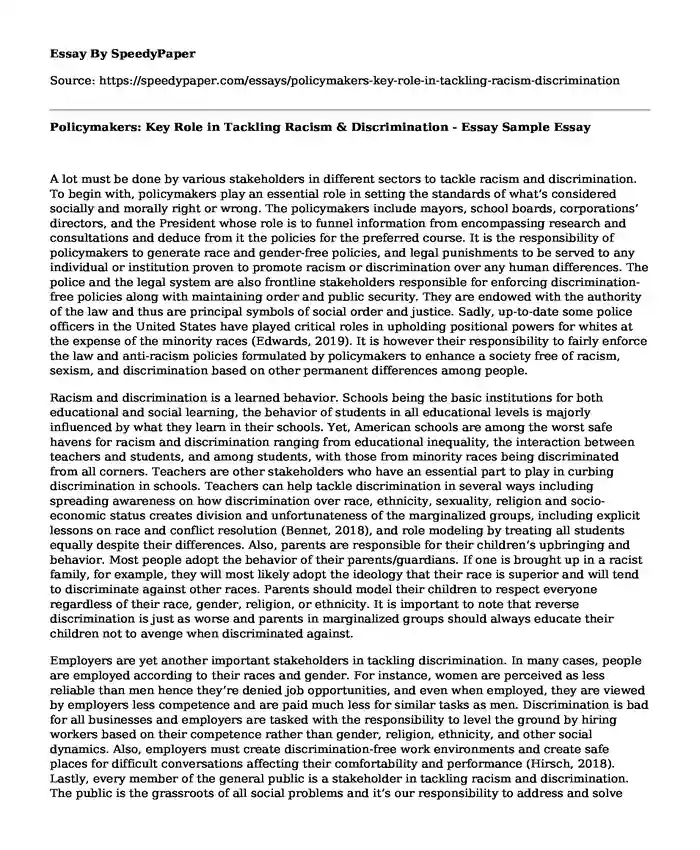
| Type of paper: | Essay |
| Categories: | Racism Policy Discrimination Abuse Society |
| Pages: | 3 |
| Wordcount: | 711 words |
A lot must be done by various stakeholders in different sectors to tackle racism and discrimination. To begin with, policymakers play an essential role in setting the standards of what’s considered socially and morally right or wrong. The policymakers include mayors, school boards, corporations’ directors, and the President whose role is to funnel information from encompassing research and consultations and deduce from it the policies for the preferred course. It is the responsibility of policymakers to generate race and gender-free policies, and legal punishments to be served to any individual or institution proven to promote racism or discrimination over any human differences. The police and the legal system are also frontline stakeholders responsible for enforcing discrimination-free policies along with maintaining order and public security. They are endowed with the authority of the law and thus are principal symbols of social order and justice. Sadly, up-to-date some police officers in the United States have played critical roles in upholding positional powers for whites at the expense of the minority races (Edwards, 2019). It is however their responsibility to fairly enforce the law and anti-racism policies formulated by policymakers to enhance a society free of racism, sexism, and discrimination based on other permanent differences among people.
Racism and discrimination is a learned behavior. Schools being the basic institutions for both educational and social learning, the behavior of students in all educational levels is majorly influenced by what they learn in their schools. Yet, American schools are among the worst safe havens for racism and discrimination ranging from educational inequality, the interaction between teachers and students, and among students, with those from minority races being discriminated from all corners. Teachers are other stakeholders who have an essential part to play in curbing discrimination in schools. Teachers can help tackle discrimination in several ways including spreading awareness on how discrimination over race, ethnicity, sexuality, religion and socio-economic status creates division and unfortunateness of the marginalized groups, including explicit lessons on race and conflict resolution (Bennet, 2018), and role modeling by treating all students equally despite their differences. Also, parents are responsible for their children’s upbringing and behavior. Most people adopt the behavior of their parents/guardians. If one is brought up in a racist family, for example, they will most likely adopt the ideology that their race is superior and will tend to discriminate against other races. Parents should model their children to respect everyone regardless of their race, gender, religion, or ethnicity. It is important to note that reverse discrimination is just as worse and parents in marginalized groups should always educate their children not to avenge when discriminated against.
Employers are yet another important stakeholders in tackling discrimination. In many cases, people are employed according to their races and gender. For instance, women are perceived as less reliable than men hence they’re denied job opportunities, and even when employed, they are viewed by employers less competence and are paid much less for similar tasks as men. Discrimination is bad for all businesses and employers are tasked with the responsibility to level the ground by hiring workers based on their competence rather than gender, religion, ethnicity, and other social dynamics. Also, employers must create discrimination-free work environments and create safe places for difficult conversations affecting their comfortability and performance (Hirsch, 2018). Lastly, every member of the general public is a stakeholder in tackling racism and discrimination. The public is the grassroots of all social problems and it’s our responsibility to address and solve them. Individually, everyone must respect human dignity and treat everybody equally, address or report any incidence of discrimination they witness, and not entertain discriminators by offering them audience or speculations, rather, they should let the discriminators know the effect of their actions. If all of the stakeholders play their part, we’ll effectively eliminate racism and discrimination along with other social problems from society.
References
Bennet, N. (2018). 6 Ways to Prevent Racism in Schools. Retrieved 18 July 2020 from https://www.kickboardforschools.com/blog/post/diversity-equity/6-ways-to-prevent-racism-in-schools/
Edwards, C. (2018). Race and the Police. Retrieved 18 July 2020 from https://www.kickboardforschools.com/blog/post/diversity-equity/6-ways-to-prevent-racism-in-schools/https://www.policefoundation.org/race-and-the-police/
Hirsch, A. (2018). Taking Steps to Eliminate Racism in the Workplace. Retrieved 18 July 2020 from https://www.policefoundation.org/race-and-the-police/
Cite this page
Policymakers: Key Role in Tackling Racism & Discrimination - Essay Sample. (2023, Oct 15). Retrieved from https://speedypaper.com/essays/policymakers-key-role-in-tackling-racism-discrimination
Request Removal
If you are the original author of this essay and no longer wish to have it published on the SpeedyPaper website, please click below to request its removal:
- Free Essay on the Impact of White Male Privilege on Identity Formation of Mexican Women
- Essay Example on the Representation of Gender in the Postcolonial Era
- Does Violent Media Cause Violence In Real Life? Find Answer in Our Essay Example
- Essay Sample on Problems Historically Faced by Women
- Staff and Line Positions - Free Essay Example
- Paper Example on Maternal Smoking during Pregnancy
- The Life Story and Impact of Abel Shingange: Essay Sample
Popular categories




